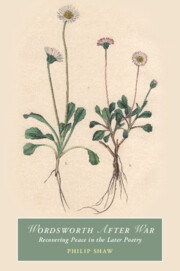Wordsworth After War
William Wordsworth’s later poetry complicates possibilities of life and art in war’s aftermath. This illuminating study provides new perspectives and reveals how his work following the end of the revolutionary and Napoleonic wars reflects a passionate, lifelong engagement with the poetics and politics of peace. Focussing on poetry and prose from between 1814 and 1822, Philip Shaw constructs a unique and compelling account of how Wordsworth, in both his ongoing poetic output and in his revisions to earlier works, sought to modify, refute, and sometimes sustain his early engagement with these issues as both an artist and a political thinker. In an engaging style, Shaw reorients our understanding of the later writings of a major British poet and the post-war literary culture in which his reputation was forged. This title is part of the Flip it Open Programme and may also be available Open Access. Check our website Cambridge Core for details.
Philip Shaw is Professor of Romantic Studies at the University of Leicester. He has written extensively on Romantic-period literature, specialising in literary and visual responses to the revolutionary and Napoleonic wars. His books include Romantic Wars (2000), Waterloo and the Romantic Imagination (2002), The Sublime (2006/2017), and Suffering and Sentiment in Romantic Military Art (2013).

